Wood Islands Lighthouse
The Wood Islands Lighthouse is a historic lighthouse built by Joseph Tomlinson III situated on the southeastern shore of Prince Edward Island, located in the community of Wood Islands. The lighthouse is a well-preserved three storey tower with an adjoining 1 1⁄2-storey keeper's residence. The white shingled tower is topped by a red iron lantern, which is enclosed by a white railing on the observation deck. The red roof of the dwelling provides a striking contrast to the white shingled exterior of the dwelling.[1][2]
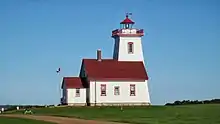 Wood Islands Lighthouse | |
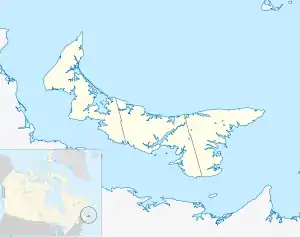 Location on Prince Edward Island | |
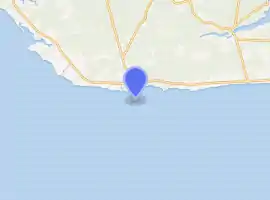
| |
| Location | Wood Islands Prince Edward Island Canada |
|---|---|
| Coordinates | 45°57′00″N 62°44′46″W |
| Year first constructed | 1875 for 1876 |
| Year first lit | 1876 |
| Automated | Electrification 1958 |
| Deactivated | Destaffing 1990 |
| Foundation | stone basement |
| Construction | Wooded Tower |
| Tower shape | square tower with balcony and lantern |
| Markings / pattern | white tower, red lantern and balcony |
| Tower height | 16.5 metres (54 ft) |
| Focal height | 21.8 metres (72 ft) |
| Range | Nominal 12 nautical miles |
| Characteristic | Iso W 10s. |
| Fog signal | 1941 - 1998 |
| Admiralty number | H0962 |
| CHS number | CCG 976 |
| NGA number | 8164 |
| ARLHS number | CAN-535 |
| Managing agent | Wood Islands and Area Development Corporation |
| Heritage | designated heritage place, recognized federal heritage building of Canada |
It was one of the last three lights on Prince Edward Island to be fully automated, and the last where the keeper and his family lived. The lighthouse and residence are now open as a museum, with exhibits about the history of lighthouses, ferry service and fishing on the island, and includes a 1950s period kitchen and keeper's quarters.[3]
History
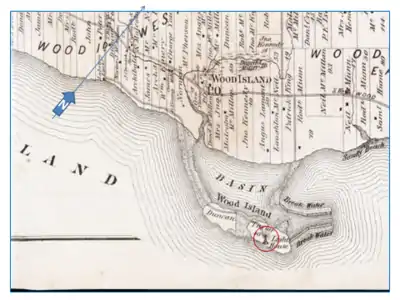
During its session of 1874, the Canadian Parliament appropriated $6,000 for the construction of a lighthouse at Wood Island, on a site purchased from Thomas McMahon in June 1875, being finished in the autumn of 1876, it was put into operation on 1 November 1876. Archibald MacKay of New Brunswick first signed the contract to construct the lighthouse, making little progress into 1875 he abandoned his efforts and Donald MacMillan, a local master carpenter, was hired to complete the lighthouse.[4][5]
Prior to the construction of the federal ferry wharf, that began in 1937; the light served as a navigation aid to marine traffic in the Northumberland Strait and fishing boats in and around Wood Islands Harbour. From 1940, Northumberland Ferries Limited began to use this coastal light for their seasonal ferry service operating between Wood Islands and Caribou, Nova Scotia. In 1950, the dwelling attached to the tower was renovated with a new kitchen built to accommodate the light keeper, and in 1958, the dwelling and lighthouse were wired for electricity. The light then operated on a 1000 watt airway beacon lamp and changed from a fixed light to a revolving flashing light, which is still in use.[6][7]
In 1984 light tower was renovated when a generator and fog alarm equipment were installed, windows were changed to accommodate ventilators, a halon fire alarm system was installed and a balcony was built in 1984 to accommodate the fog alarm equipment.[6] After 133 years on one spot, shoreline erosion forced the moving of the lighthouse, from just a few metres above the Northumberland Straight, back 70 metres back to more solid ground, on March 10, 2009. The move was made in winter so the ground would be solid enough to support the structure for the move.[8]
Keepers
Early light-keepers had a significant challenge in access, to their home and the light, as it could only be approached through dense woods and along the beach from well west of the lighthouse. The light was initially accessed from a track running south down now Pioneer Cemetery Road, to a land spit stretching south from 'Wood Island', over a sand bar, to its southeast island corner location. With time, this track was lost and a new land was access gained running south from now McLeod Road. The southeast island came to be attached to shore with changes in the harbour design, with the construction of the Wood Islands ferry terminal and its ferry berthing docks.[9][10]
| Keeper [4] | Period of Service | Notes / Comments |
|---|---|---|
| James MacMillan | 1876 – 1887 | Assisted by Son Neil |
| William D. MacMillan | 1887 – 1898 | Dismissed for Political Activity |
| John Roderick W. McKay | 1898 – 1912 | Lived in Wood Islands |
| Levi Morrow | 1912 – 1924 | Lived in Iris, PE |
| Thomas Art Smith | 1924 – 1949 | From New Glasgow, NS |
| George Stewart | 1949 – 1972 | WW2 Medal of Bravery 1945 |
| Manson E. Murchison | 1972 – 1974 | WW2 Veteran: Italy / France |
| Bernard Beaton | 1975 – 1976 | From Cape Breton, NS |
| Leon Patton | 1977 – 1990 | From Cape Breton, NS |
 Wood Islands Front Range | |
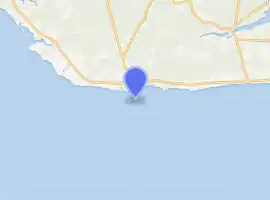
| |
| Location | Wood Islands, PE |
|---|---|
| Coordinates | 45°57′00″N 62°44′44″W (rear) 45°57′01″N 62°44′46″W (front) |
| Year first constructed | 1902 |
| Automated | 1990 |
| Deactivated | 2007 |
| Construction | wooden tower |
| Tower shape | square tower with lantern and gallery |
| Markings / pattern | white tower, red vertical stripe on the range line |
| Tower height | 16.5 metre |
| Focal height | 21.8 metre |
| Range | 12 nautical mile |
| Characteristic | Iso W 10s |
| Managing agent | Wood Islands Lighthouse |
| Heritage | designated heritage place, recognized federal heritage building of Canada |
Harbour Range Lights
The Wood Islands Harbour Range Lights are a set of range lights at Wood Islands, Prince Edward Island, Canada, are now located by the Wood Islands Lighthouse, it built in 1876. The Wood Islands Harbour Front Range and Wood Islands Harbour Rear Range were built in September 1902, they were relocated to the southern pier at the harbour entrance in 1940, and no longer active.[11]
Designed by the Department of Marine, and built by M. Walsh, the Front Range Light began as a square, wooden, tapered light covered with metal siding, standing 4.5 m (18.4 feet) in height from base to vane. It later gained its attached shed and a gable roof, over its door. The larger Back Range Light, of the same builder and designer, has retained its design with its most outstanding feature being the lantern deck's wooden railing and supporting wooden brackets.[7]
Range (leading) lights, placed in line, are used as inbound aids to navigation, for a tight entry into dangerous narrow and/or shallow channels. Though they may be any two objects in line, typically they are distinctive lights operating as a pair, the front range beacon being lower than the rear, to form a range (leading line), when brought into transit. The one nearest to the observer is the front light and the one farthest from the observer is the rear light.[12] When both ranges are aligned the vessel is on a correct bearing. If a ship veers too far to the right, the rear range appears to drift to the right of the front range; if the error is to the left, the rear drifts left.[13]
| Designation Source | Front Range Number | Rear Range Number |
|---|---|---|
| Admiralty | H0964 | H0964.1 |
| Canada F&O | CCG 973 | CCG 974 |
| NGA | 8168 | 8172 |
| ARLHS | CAN-536 | CAN-537 |
| Standing Height | 6 m / 20 ft | 10 m / 33 ft |
References
- Canada, Province of Prince Edward Island. "Historic Places, Prince Edward Island, Wood Islands Lighthouse". www.gov.pe.ca. Retrieved 2018-02-25.
- "Prince Edward Island Lighthouse Society". Retrieved 30 April 2016.
- "Home". Woods Island Lighthouse. Retrieved 7 December 2016.
- "Wood Islands Lighthouse". LighthouseFriends. Retrieved 2018-02-25.
- "Wood Island Lightkeepers - Lighthouses of Prince Edward Island". Retrieved 30 April 2016.
- "Prince Edward Island Lighthouse Society". www.peilighthousesociety.ca. Retrieved 2018-02-25.
- "Wood Islands Lighthouse History - Lighthouses of Prince Edward Island". www.virtualmuseum.ca. Retrieved 2018-02-25.
- "Moving day for Wood Islands Lighthouse". CBC News. Retrieved 2018-02-25.
- "Collection". Retrieved 30 April 2016.
- "Collection". Retrieved 30 April 2016.
- Rowlett, Russ. "Lighthouses of Canada: Eastern Prince Edward Island". The Lighthouse Directory. University of North Carolina at Chapel Hill. Retrieved August 2, 2009.
- Willemsen, Diederik. "Lights, buoys - aids to navigation". www.sailingissues.com. Retrieved 2018-02-25.
- Bachand, Robert (February 3, 2017). "Aids to Navigation Range (Leading) Lights". Boating World | Current Issue. Retrieved 2018-02-25.
External links
| Wikimedia Commons has media related to Wood Islands Lighthouse. |
- Woods Islands Lighthouse Museum and Interpretive Centre,
- Aids to Navigation Canadian Coast Guard